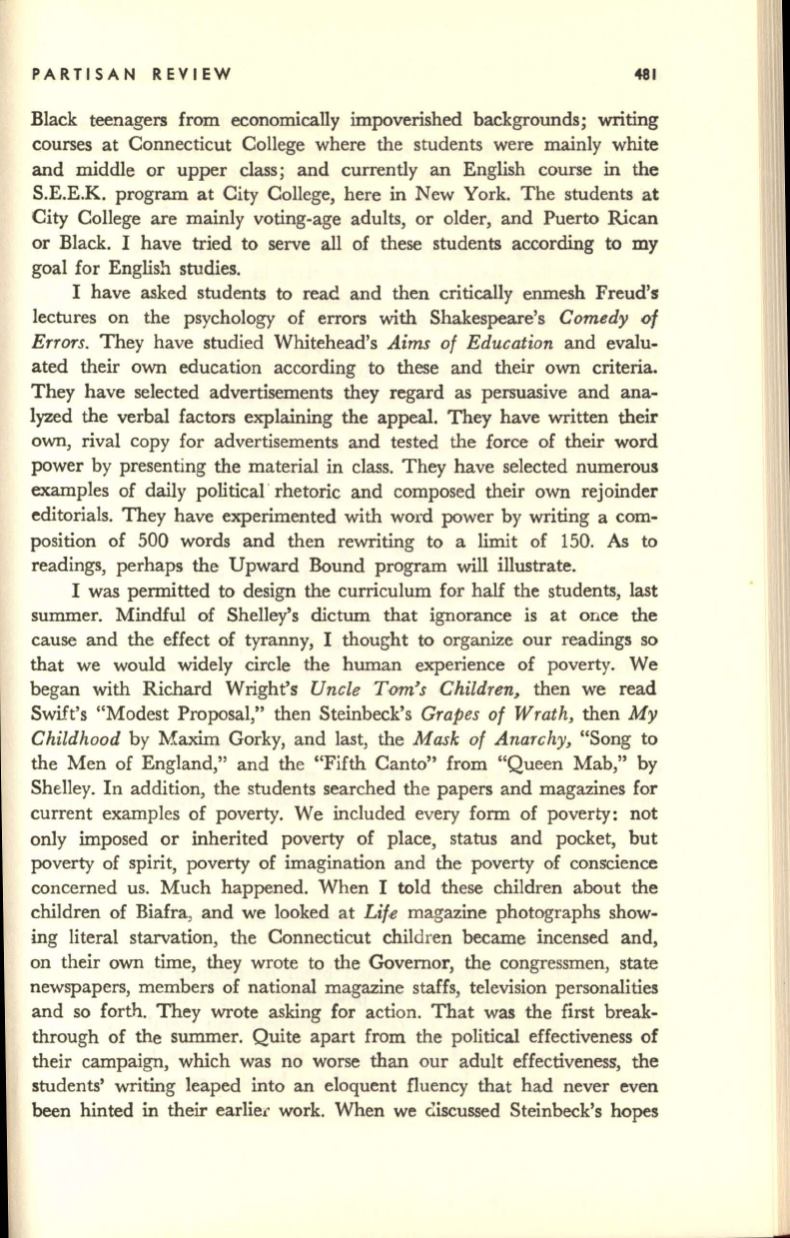
PARTISAN REVIEW
481
Black teenagers from economically impoverished backgrounds; writing
courses at Connecticut College where the students were mainly white
and middle or upper class; and currently an English course in the
S.E.E.K. program at City College, here in New York. The students at
City College are mainly voting-age adults, or older, and Puerto Rican
or Black. I have tried to serve all of these students according to my
goal for English studies.
I have asked students to read and then critically enmesh Freud's
lectures on the psychology of errors with Shakespeare's
Comedy of
Errors.
They have studied Whitehead's
Aims of Education
and evalu–
ated their own education according to these and their own criteria.
They have selected advertisements they regard as persuasive and ana–
lyzed the verbal factors explaining the appeal. They have written their
own, rival copy for advertisements and tested the force of their word
power by presenting the material in class. They have selected numerous
examples of daily political ' rhetoric and composed their own rejoinder
editorials. They have experimented with word power by writing a com–
position of 500 words and then rewriting to a limit of 150. As to
readings, perhaps the Upward Bound program will illustrate.
I was permitted to design the curriculum for half the students, last
summer. Mindful of Shelley's dictum that ignorance is at once the
cause and the effect of tyranny, I thought to organize our readings so
that we would widely circle the human experience of poverty. We
began with Richard Wright's
Uncle Tom's Children,
then we read
Swift's "Modest Proposal," then Steinbeck's
Grapes of Wrath,
then
My
Childhood
by Maxim Gorky, and last, the
Mask of Anarchy,
"Song to
the Men of England," and the "Fifth Canto" from "Queen Mab," by
Shelley. In addition, the students searched the papers and magazines for
current examples of poverty. We included every form of poverty: not
only imposed or inherited poverty of place, status and pocket, but
poverty of spirit, poverty of imagination and the poverty of conscience
concerned us. Much happened. When I told these children about the
children of Biafra, and we looked at
Life
magazine photographs show–
ing literal starvation, the Connecticut children became incensed and,
on their own time, they wrote to the Governor, the congressmen, state
newspapers, members of national magazine staffs, television personalities
and so forth. They wrote asking for action. That was the first break–
through of the summer. Quite apart from the political effectiveness of
their campaign, which was no worse than our adult effectiveness, the
students' writing leaped into an eloquent fluency that had never even
been hinted in their earlier work. When we discussed Steinbeck's hopes


